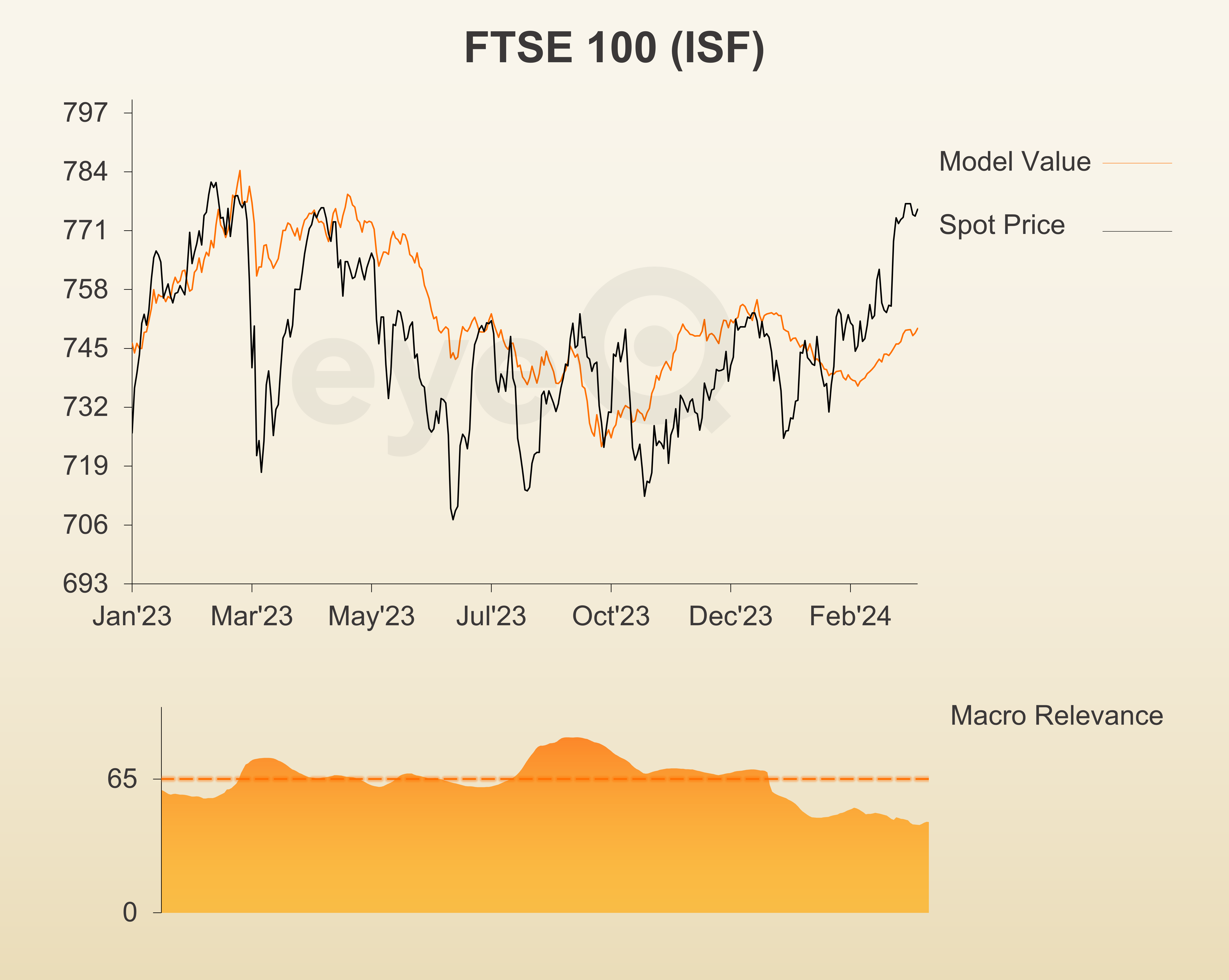eyeQ: FTSE 100 is cheap, but is it right time to buy?
interactive investor has teamed up with the experts at eyeQ who use artificial intelligence and their own smart machine to analyse macro conditions and generate actionable trading signals. Here, they assess the timing of a buy trade.
4th April 2024 11:51
by Huw Roberts from eyeQ

"Our signals are crafted through macro-valuation, trend analysis, and meticulous back-testing. This combination ensures a comprehensive evaluation of an asset's value, market conditions, and historical performance." eyeQ
Discover: eyeQ analysis explained | eyeQ: our smart machine in action | Glossary
iShares Core FTSE 100 ETF (LSE:ISF)
Trading signal: long-term strategic model
Model value: 749.70
Fair Value Gap: +3.39% premium
Macro relevance: 44%
Data correct as at 4 April 2024. Please click glossary for explanation of terms.
The FTSE 100 is getting close to the 8,000 mark again. It briefly topped 8,000 in February 2023 and also earlier this week, but the psychological impact of breaking and holding that level would be significant.
There is no doubt that UK equities are cheap relative to their peers, so any good news such as chart breaks that attract fresh momentum buying can only be a good thing.
UK equities have already hit some other significant milestones recently. For example, last week the FTSE 100 returned to being worth more than Apple Inc (NASDAQ:AAPL) in US dollar terms. For a period, the 100 biggest British blue-chips were smaller than one US technology firm. Admittedly, Apple is no ordinary tech firm. And part of the story is Apple having a bad year; it’s down almost 14% since the December highs. But even so there are straws in the wind suggesting UK stocks are slowly but surely staging something of a comeback.
That’s the good news.
The bad news is eyeQ’s smart machine says this recent good run has gone too far too quickly. The 6% rally in the iShares Core FTSE 100 ETF GBP Dist (LSE:ISF) from the mid-February lows has overshot relative to macro fundamentals which have risen just over 1% in the last month. Overall macro conditions are improving - it’s just that this rally has overshot.

Source: eyeQ. Past performance is not a guide to future performance.
There is a “but”.
Macro relevance of 44% means big picture stuff such as economic growth, inflation and the Bank of England explains less than half of price action right now. Some other drivers are more important. That could be the fact that the UK is cheap relative to international equity markets; or that momentum is starting to build.
But, from a macro perspective, this is not the right time to chase. Be patient, wait for a pullback before adding to UK equity exposure.
Useful terminology:
Model value
Where our smart machine calculates that any stock market index, singe stock or exchange-traded fund (ETF) should be priced (the fair value) given the overall macroeconomic environment.
Model (macro) relevance
How confident we are in the model value. The higher the number the better! Above 65% means the macro environment is critical, so any valuation signals carry strong weight. Below 65%, we deem that something other than macro is driving the price.
Fair Value Gap (FVG)
The difference between our model value (fair value) and where the price currently is. A positive Fair Value Gap means the security is above the model value, which we refer to as “rich”. A negative FVG means that it's cheap. The bigger the FVG, the bigger the dislocation and therefore a better entry level for trades.
Long Term model
This model looks at share prices over the last 12 months, captures the company’s relationship with growth, inflation, currency shifts, central bank policy etc and calculates our key results - model value, model relevance, Fair Value Gap.
These third-party research articles are provided by eyeQ (Quant Insight). interactive investor does not make any representation as to the completeness, accuracy or timeliness of the information provided, nor do we accept any liability for any losses, costs, liabilities or expenses that may arise directly or indirectly from your use of, or reliance on, the information (except where we have acted negligently, fraudulently or in wilful default in relation to the production or distribution of the information).
The value of your investments may go down as well as up. You may not get back all the money that you invest.
Equity research is provided for information purposes only. Neither eyeQ (Quant Insight) nor interactive investor have considered your personal circumstances, and the information provided should not be considered a personal recommendation. If you are in any doubt as to the action you should take, please consult an authorised financial adviser.
Disclosure
We use a combination of fundamental and technical analysis in forming our view as to the valuation and prospects of an investment. Where relevant we have set out those particular matters we think are important in the above article, but further detail can be found here.
Please note that our article on this investment should not be considered to be a regular publication.
Details of all recommendations issued by ii during the previous 12-month period can be found here.
ii adheres to a strict code of conduct. Contributors may hold shares or have other interests in companies included in these portfolios, which could create a conflict of interests. Contributors intending to write about any financial instruments in which they have an interest are required to disclose such interest to ii and in the article itself. ii will at all times consider whether such interest impairs the objectivity of the recommendation.
In addition, individuals involved in the production of investment articles are subject to a personal account dealing restriction, which prevents them from placing a transaction in the specified instrument(s) for a period before and for five working days after such publication. This is to avoid personal interests conflicting with the interests of the recipients of those investment articles.